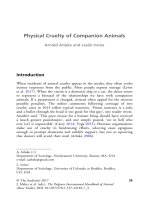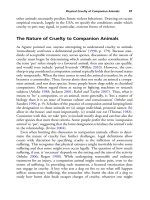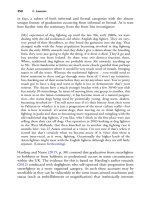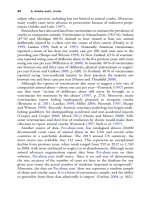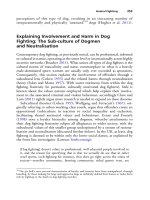The palgrave international handbook of a 167
Bạn đang xem bản rút gọn của tài liệu. Xem và tải ngay bản đầy đủ của tài liệu tại đây (36.08 KB, 1 trang )
Breeding and Rearing Farmed Animals
Erika Cudworth
Introduction
This chapter examines the mass breeding and raising of animals for meat and
other ‘animal products’ (eggs, ‘dairy’ products). The most common relationship we have with domesticated non-human animals1 is that we eat them,
and this requires the routine breeding and raising of enormous populations.
The farming of animals has long been the most significant social formation
of human–animal relations and does not happen discreetly within national
boundaries, but is a process that has been international in scope and is
industrial in its scale of operation. While this chapter focuses on the breeding
and rearing of the most commonly eaten domesticated land-dwelling animals
Throughout this chapter, the term ‘farmed’ rather than ‘farm’ animals will be used. This is consistent
with critical approaches in animal studies which emphasise that the raising of non-human animals for
food is something which is done to non-human animals rather than a neutral status which some kinds of
domesticated species occupy.
1
The term ‘non-human animals’ is used to make clear that the author knows that humans are animals!
Where the term ‘animal(s)’ is used, it should be read as ‘non-human animals’ but has been shortened for
ease of reading only.
E. Cudworth (*)
School of Social Sciences, University of East London, UK,
London, United Kingdom
e-mail:
© The Author(s) 2017
J. Maher et al. (eds.), The Palgrave International Handbook of Animal
Abuse Studies, DOI 10.1057/978-1-137-43183-7_8
159
